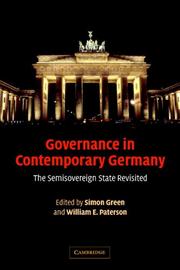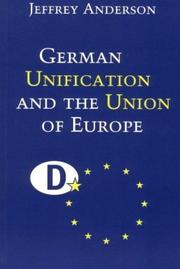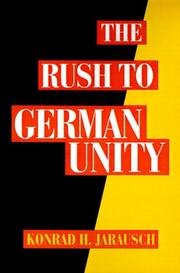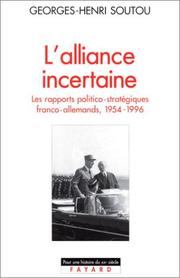| Listing 1 - 10 of 12 | << page >> |
Sort by
|
Book
ISBN: 0262193272 0262283727 058533207X 9780585332079 9780262283724 9780262193276 Year: 1992 Publisher: Cambridge, Mass. : MIT Press,
Abstract | Keywords | Export | Availability | Bookmark
 Loading...
Loading...Choose an application
- Reference Manager
- EndNote
- RefWorks (Direct export to RefWorks)
Germany --- Allemagne --- Economic policy --- Economic conditions --- History --- Politique économique --- Conditions économiques --- Histoire --- 1990 --- -Germany --- Unification, 1990 --- Germany - Economic policy - 1990 --- -Germany - Economic conditions - 1990 --- -Germany - History - Unification, 1990. --- -Germany - History - Unification, 1990

ISBN: 9780521613163 9780511807749 9780521848817 051112600X 9780511126000 0511125143 9780511125140 0511807740 1280431474 9781280431470 0521848814 0521613167 1107153123 9781107153127 0511182058 9780511182051 0511199279 9780511199271 0511299974 9780511299971 Year: 2005 Publisher: Cambridge Cambridge University Press
Abstract | Keywords | Export | Availability | Bookmark
 Loading...
Loading...Choose an application
- Reference Manager
- EndNote
- RefWorks (Direct export to RefWorks)
Throughout the 1970s and 1980s, West Germany was considered to be one of the world's most successful economic and political systems. In his seminal 1987 analysis of West Germany's 'semisovereign' system of governance, Peter Katzenstein attributed this success to a combination of a fragmented polity, consensus politics and incremental policy changes. However, unification in 1990 has both changed Germany's institutional configuration and created economic and social challenges on a huge scale. This 2005 volume therefore asks whether semisovereignty still exists in contemporary Germany and, crucially, whether it remains an asset in terms of addressing these challenges. By shadowing and building on the original study, an eminent team of British, German and American scholars analyses institutional changes and the resulting policy developments in key sectors, with Peter Katzenstein himself providing the conclusion. Together, the chapters provide a landmark assessment of the outcomes produced by one of the world's most important countries.
Germany --- Politics and government --- History --- Allemagne --- Politique et gouvernement --- Histoire --- Social Sciences --- Political Science --- Germany - Politics and government - 1990 --- -Germany - History - Unification, 1990
Book

ISBN: 2910212114 2878547942 9782910212117 Year: 2018 Volume: 25 Publisher: Paris : Presses Sorbonne Nouvelle,
Abstract | Keywords | Export | Availability | Bookmark
 Loading...
Loading...Choose an application
- Reference Manager
- EndNote
- RefWorks (Direct export to RefWorks)
L'unification de l'Allemagne en 1990 a suscité durant son déroulement espoirs, craintes et projets contradictoires, actions et réactions nombreuses. Au fur et à mesure de leur ouverture, les archives permettent aujourd'hui de confirmer certaines interprétations ou de les éclairer sous un jour nouveau.
Germany --- Germany (West) --- Germany (East) --- History --- Politics and government. --- Politics and government --- 1990 --- -Germany [West ] --- 1989-1990 --- Germany - History - Unification, 1990. --- Germany (West) - Politics and government. --- Germany (East) - Politics and government - 1989-1990. --- tournant --- archives --- Allemagne
Book

ISBN: 2905518634 2905518413 9782905518415 Year: 2017 Publisher: Cergy-Pontoise : CIRAC,
Abstract | Keywords | Export | Availability | Bookmark
 Loading...
Loading...Choose an application
- Reference Manager
- EndNote
- RefWorks (Direct export to RefWorks)
Depuis quelque temps, notre partenaire privilégié dans l'Union européenne nous fascine et nous irrite à la fois. Première puissance économique européenne, l'Allemagne semble aujourd'hui abandonner cette retenue qui caractérisait jusqu'ici sa politique extérieure et européenne pour exercer un leadership politique de fait dans une Europe qui se cherche. Il est vrai qu'en cela l'Allemagne défend désormais, plus que par le passé, ses intérêts nationaux légitimes. Cette évolution ne traduit pas tant la volonté d'affirmer une quelconque suprématie politique puisque la République fédérale, qui n'a reconquis sa pleine souveraineté qu'en 1990 avec l'Unité allemande, en a alors immédiatement rétrocédé une grande partie à l'UE dans des domaines vitaux, au premier rang desquels celui de la monnaie. Le fait qu'elle tienne désormais à jouer pleinement son rôle dans le gouvernement partagé de l'Union procède plutôt d'une nouvelle identité qui a émergé au fil des générations. Cette identité se nourrit de l'expérience des épreuves surmontées, et surtout de la confiance acquise dans la capacité des décideurs publics et privés, comme de la société dans son ensemble, à édifier un système démocratique, économique, social et monétaire durable qui résiste aux chocs d'un monde imprévisible et instable. Assumant pleinement leur passé, les Allemands ont en même temps acquis la conscience du chemin parcouru, de la stabilité de ce qu'ils ont reconstruit, et aussi de la nécessité de le préserver en affrontant courageusement l'avenir. C'est cette identité collective qui explique que l'Allemagne se présente, aujourd'hui, pleinement souveraine en elle-même, c'est-à-dire consciente de ses acquis et de son expérience, fière de ses principes et de ses valeurs, confiante dans sa capacité à proposer des choix aux Européens et à en assumer les responsabilités. Comment cette nouvelle Allemagne « souveraine » s'est-elle construite, et sur quels fondements ? C'est ce cheminement, à trajectoires…
European Union --- Germany --- Politics and government --- Economic conditions --- History --- E.U. --- Histoire --- Allemagne --- Germany - Politics and government - 1990 --- -Germany - Economic conditions - 1990 --- -Germany - History - Unification, 1990 --- intégration européenne --- identité --- réunification --- économie sociale de marché --- unité allemande

ISBN: 1107111307 0511003056 1280420448 0511171811 0511149190 051130949X 0511491891 051105193X 9780511003059 9780521643559 0521643554 9780511491894 9786610420445 6610420440 0521643554 0521643902 9780521643900 9781107111301 9781280420443 9780511171819 9780511149191 Year: 1999 Publisher: Cambridge Cambridge University Press
Abstract | Keywords | Export | Availability | Bookmark
 Loading...
Loading...Choose an application
- Reference Manager
- EndNote
- RefWorks (Direct export to RefWorks)
German Unification and the Union of Europe discusses some of the most interesting questions in the study of comparative politics and international relations. The book studies the sources of continuity and change in German policy toward the European Union, set in the context of the competing pulls of integration into the EU, and unification of East and West Germany. Employing a framework of analysis premised on the interaction of interests, institutions and ideas, the book asks: how has the domestic politics of unification influenced German policy toward Europe? Why has continuity reigned in some areas, whereas in others significant changes, sometimes reversals, have been registered? What are the implications of this checkered pattern of outcomes for Germany and for Europe? Jeffrey Anderson's book focusses on the political economy issues (such as trade, internal market, energy, and industrial policy) which represent key components of both German domestic politics and Germany's relationship with Europe. Awarded the DAAD 2000 Prize for Distinguished Scholarship in German Studies: Politics and Foreign Policy.
European Union --- E.U. --- Germany --- Europe --- History --- Relations --- Commercial policy. --- Allemagne --- Histoire --- Politique commerciale --- Internal politics --- International relations. Foreign policy --- Unification, 1990 --- Union européenne --- Commercial policy --- Social Sciences --- Political Science

ISBN: 1280527110 0195358945 1429405783 9780195358940 9781280527111 9780195072754 0195072758 9786610527113 6610527113 0195085779 9780195085778 0195072758 0197715990 9781429405782 Year: 1994 Publisher: New York : Oxford University Press,
Abstract | Keywords | Export | Availability | Bookmark
 Loading...
Loading...Choose an application
- Reference Manager
- EndNote
- RefWorks (Direct export to RefWorks)
An historical event of the first magnitude, German unification has transformed the face of Europe. This historical reconstruction of the momentous event provides informed analyses for both students of German history and historians requiring more information on the reunification process.
German reunification question (1949-1990) --- Opposition (Political science) --- German question (1949-1990) --- German unification question (1949-1990) --- Reunification of Germany question (1949-1990) --- Unification of Germany question (1949-1990) --- Germany (East) --- Germany --- Politics and government --- Social conditions. --- History --- 1989-1990 --- Social conditions --- Unification, 1990 --- Germany (East) - Politics and government - 1989-1990.
Book
ISBN: 3458336907 9783458336907 Year: 1990 Volume: 1990 Publisher: Frankfurt am Main Insel
Abstract | Keywords | Export | Availability | Bookmark
 Loading...
Loading...Choose an application
- Reference Manager
- EndNote
- RefWorks (Direct export to RefWorks)
Territory, National --- Public law --- Territoire national --- Droit public --- Germany --- Germany (West) --- Germany (East) --- Allemagne --- Allemagne (Ouest) --- Allemagne (Est) --- History --- Foreign relations --- Histoire --- Relations extérieures --- -Territory, National --- -Public law --- -Law --- National territory --- Boundaries --- -Germany (West) --- -Germany (East) --- -Foreign relations --- -Germany --- -History --- Relations extérieures --- Law --- Territory, National - Germany --- Public law - Germany --- Public law - Germany (West) --- Public law - Germany (East) --- Germany - History - Unification, 1990 --- Germany (West) - Foreign relations - Germany (East) --- Germany (East) - Foreign relations - Germany (West)
Book
ISBN: 9089644008 9048515653 9789048515653 9789048515660 9048515661 9789089644008 Year: 2012 Volume: 6 Publisher: Amsterdam
Abstract | Keywords | Export | Availability | Bookmark
 Loading...
Loading...Choose an application
- Reference Manager
- EndNote
- RefWorks (Direct export to RefWorks)
In 1989 news broadcasts all over the world were dominated for weeks by images of East Germans crossing the Berlin Wall to West Germany. But what did the East Germans expect to find when they excitedly broke through the Wall? And what did they actually find when they made it over to the other side? This study draws on fifteen months of research into both the lives of East Germans before the fall of communism and their fast-changing world after they embraced capitalism. Grounded in powerful anthropological insights, Milena Veenis argues persuasively that national identifications and the bond between state and citizenry in both East and West Germany over the past twenty years has been shaped by the far-fetched, socialist and capitalist promises of consumption as the road to ultimate well-being. These promises also functioned as a way to cover up the more shameful and dirty aspects of both countries history and social life.
Consumption (Economics) -- Germany (East). --- Germany -- History -- Unification, 1990. --- Germany -- Social conditions -- 1990-. --- Germany (East) -- Relations -- Germany (West). --- Germany (West) -- Relations -- Germany (East). --- Post-communism -- Germany (East). --- Quality of life -- Germany (East). --- Quality of life -- Germany (West). --- Post-communism --- Consumption (Economics) --- Quality of life --- Business & Economics --- Economic History --- Germany (East) --- Germany (West) --- Germany --- Relations --- History --- Social conditions --- Life, Quality of --- Postcommunism --- Economic history --- Human ecology --- Life --- Social history --- Basic needs --- Human comfort --- Social accounting --- Work-life balance --- World politics --- Communism --- E-books
Book
ISBN: 2859395717 2757426540 Year: 2020 Volume: *3 Publisher: Villeneuve d'Ascq : Presses universitaires du Septentrion,
Abstract | Keywords | Export | Availability | Bookmark
 Loading...
Loading...Choose an application
- Reference Manager
- EndNote
- RefWorks (Direct export to RefWorks)
En 1989, la chute du mur a surpris les esprits à l’Ouest, plus encore qu’à l’Est. Depuis cet événement, on essaie de comprendre comment et pourquoi un État qui fêtait son quarantième anniversaire, qui se croyait protégé par un mur auquel Erich Honecker prédisait une longue existence, s’est effondré aussi rapidement. Certes, la débâcle économique qui menaçait le pays est un facteur d’explication incontestable et déterminant. Mais, s’il peut sembler encore prématuré de vouloir dresser des bilans définitifs et donner une explication complète de l’évolution de la RDA, on peut aujourd’hui repérer d’utiles jalons quant au rôle des intellectuels dans le naufrage d’une idéologie qui avait imposé ses marques à toute une partie du monde. Cet ouvrage présente une première approche du processus d’unification allemande, vue sous l’angle de l’action des intellectuels à l’intérieur et à l’extérieur de la RDA et organisée autour de grands thèmes (concepts, théorie littéraire, acteurs, censure et répression, évolution de la contestation en RDA à partir des années 1980, intellectuels et unification). La période traitée s’étend de 1945 à 1990, avec quelques ouvertures sur les lendemains de l’unification allemande. L’un des aspects originaux de cette étude est de mettre l’accent sur le rôle des intellectuels européens de part et d’autre du Mur, leur relation au pouvoir politique, leur impact dans la lutte contre le pouvoir en RDA. L’ouvrage associe une présentation éclairante de faits connus aux résultats nouveaux d’une recherche menée dans les archives du « Congrès pour la liberté de la culture » aux États-Unis.
Intellectuals --- Opposition (Political science) --- German reunification question (1949-1990) --- Opposition (Science politique) --- Allemagne, Question de la réunification de l' (1949-1990) --- Political activity --- Germany (East) --- Allemagne (Est) --- Intellectual life. --- Historiography. --- Vie intellectuelle --- Historiographie --- German reunification question (1949-1990). --- Allemagne, Question de la réunification de l' (1949-1990) --- Politics and government --- 1945-1955 --- Germany --- History --- Unification, 1990 --- German question (1949-1990) --- German unification question (1949-1990) --- Reunification of Germany question (1949-1990) --- Unification of Germany question (1949-1990) --- Intelligentsia --- Persons --- Social classes --- Specialists --- histoire --- parole --- unification --- intellectuel

ISBN: 221359757X 9782213597577 Year: 1996 Publisher: Paris Fayard
Abstract | Keywords | Export | Availability | Bookmark
 Loading...
Loading...Choose an application
- Reference Manager
- EndNote
- RefWorks (Direct export to RefWorks)
Bibliotheek François Vercammen
France --- Germany --- Allemagne --- Foreign relations --- Military relations --- Politics and government --- Relations extérieures --- Relations militaires --- Politique et gouvernement --- Cold War --- Influence. --- History, Military --- History --- Relations extérieures --- Influence --- Weimar Republic --- Germanii︠a︡ --- Германия --- BRD --- FRN --- Jirmānīya --- جرمانيا --- Nimechchyna --- Gjermani --- Federalʹna Respublika Nimechchyny --- Veĭmarskai︠a︡ Respublika --- Ashkenaz --- Germanyah --- Bundesrepublik Deutschland --- Federal Republic of Germany --- Deutschland --- Repoblika Federalin'i Alemana --- República Federal de Alemania --- Alemania --- República de Alemania --- Bu̇gd Naĭramdakh German Uls --- Kholboony Bu̇gd Naĭramdakh German Uls --- KhBNGU --- ХБНГУ --- German Uls --- Germania --- Republika Federal Alemmana --- Deutsches Reich --- Grossdeutsches Reich --- Weimarer Republik --- Vācijā --- Germany (Territory under Allied occupation, 1945-1955) --- Germany (Territory under Allied occupation, 1945-1955 : British Zone) --- Germany (Territory under Allied occupation, 1945-1955 : French Zone) --- Germany (Territory under Allied occupation, 1945-1955 : Russian Zone) --- Germany (Territory under Allied occupation, 1945-1955 : U.S. Zone) --- Germany (East) --- Germany (West) --- Holy Roman Empire --- ドイツ --- Doitsu --- ドイツ連邦共和国 --- Doitsu Renpō Kyōwakoku --- Relations --- 1945 --- -Germany --- -France --- -Cold War --- ドイツ レンポウ キョウワコク --- Deguo --- 德国 --- Gėrman --- Герман Улс --- -Cold War - Influence. --- France - Foreign relations - Germany. --- Germany - Foreign relations - France. --- France - History, Military - 20th century. --- Germany - History - Unification, 1990 - Influence. --- Cold War - Influence. --- ALLEMAGNE --- FRANCE --- RELATIONS INTERNATIONALES --- RELATIONS EXTERIEURES --- -RELATIONS EXTERIEURES --- -HISTOIRE --- HISTOIRE --- -ALLEMAGNE
| Listing 1 - 10 of 12 | << page >> |
Sort by
|

 Search
Search Feedback
Feedback About UniCat
About UniCat  Help
Help News
News